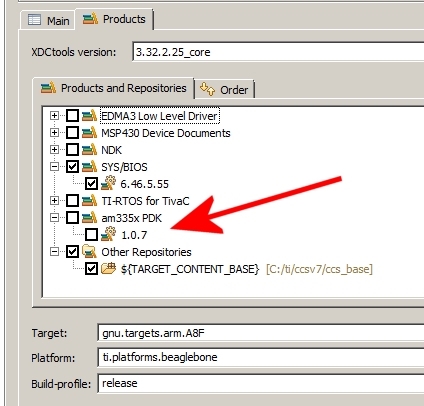Other Parts Discussed in Thread: SYSBIOS, AM3352
Tool/software: Code Composer Studio
WHY WON'T YOU PUBLISH HOW TO LINK?? How many times do I have to ask?
All this "Hidden under the covers" just makes it impossible to use any of your tools for anything but it's own incestuous demos.
Steps:
Project | New CCS Project.
BeagleBone Black - SysBios - Typical, TI Complier, ... XDC 3.32.2.25... EDMA3 LLD... am3352 PDK ... etc. (I have no idea if I need EDMA or PDK, but I added it)
Now there is a simple SysBios task based example. Builds fine... until you try to add something to it!
Lets say you want to all a simple test to blink the LED. Add this:
#include <ti/board/board.h>
static void Board_initGPIO(void)
{
Board_initCfg boardCfg;
boardCfg = BOARD_INIT_PINMUX_CONFIG |
BOARD_INIT_MODULE_CLOCK |
BOARD_INIT_UART_STDIO;
Board_init(boardCfg);
}
........
/*
* ======== main ========
*/
Int main()
{
Task_Handle task;
Error_Block eb;
Board_initGPIO();
And get this error:
undefined first referenced symbol in file --------- ---------------- Board_init ./main.obj
error #10234-D: unresolved symbols remain
I don't know where this is to link to it. There is nothing documented about where this (or any) functions are. Your tool doesn't put it in the project for me. Nowhere does anything tell me what to add to the linker to find it.
Please do not tell me to go to Resource Explorer. Everything under the "Software | Sitara" tree is nothing but silicon docs and white papers. No documentation on library functions.







